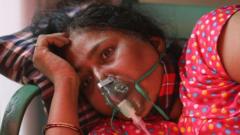In the early hours of March 24, 2020, India initiated its first Covid lockdown, just before the global pandemic escalated, resulting in tragic consequences for millions. The already strained healthcare infrastructure faltered under the tremendous pressure of the crisis, with the WHO estimating over 4.7 million Covid fatalities in India—an unofficial count nearly ten times that of the government’s figures. As time passed, BBC journalists in India reflected on their journeys through this harrowing chapter, often finding themselves intertwined with the stories they covered.
In the summer of 2021, Soutik Biswas received a desperate call from a school teacher in Delhi, frantic about her husband's urgent need for oxygen amid a catastrophic second wave of infections. Oscillating between hope and dread, he initiated a frantic search through calls and social media for life-saving oxygen supplies at a time when basic necessities became luxuries.
Yogita Limaye’s reporting brought her face-to-face with the heartbreaking reality experienced by families outside overwhelmed hospitals in Delhi, where the haunting cries for help resonated as loved ones perished waiting for treatment. With the government previously touting victory over the virus, the resurgence caught officials off guard, resulting in harrowing scenes where patients resorted to beg for attention in the face of a collapsing system.
Vikas Pandey described the constant strain of being swamped with calls from family and friends requesting help. In one devastating instance, he chronicled the tragic story of a man who lost both his father and pregnant wife to Covid. Throughout his reporting, he grappled with the harsh realities faced by countless individuals; the personal loss was palpable as he recounted experiences that often mirrored his family’s struggles against the invisible threat.
The lockdown stripped society of its normalcy, with Geeta Pandey recalling the eerie emptiness of Delhi streets as millions sought refuge with their families, fearing for their loved ones' health. Her emotional journey took a personal turn when she could not see her bedridden mother, fear of transmission overshadowing her desire to connect.
Anagha Pathak painted a poignant scene of migrant workers, including a pregnant woman, as they navigated a desolate highway towards uncertain futures after losing their livelihoods. Feeling powerless to intervene directly due to COVID protocols, she could only offer them food and water while capturing their plight.
These stories and experiences crystalize the profound impact Covid has etched on India’s fabric, encapsulating loss, resilience, and a complex web of human connections forever altered by the pandemic. As we reflect on these narratives, it serves as a poignant reminder of both the capricious nature of life and the enduring strength of the human spirit in the face of unthinkable challenges.
In the summer of 2021, Soutik Biswas received a desperate call from a school teacher in Delhi, frantic about her husband's urgent need for oxygen amid a catastrophic second wave of infections. Oscillating between hope and dread, he initiated a frantic search through calls and social media for life-saving oxygen supplies at a time when basic necessities became luxuries.
Yogita Limaye’s reporting brought her face-to-face with the heartbreaking reality experienced by families outside overwhelmed hospitals in Delhi, where the haunting cries for help resonated as loved ones perished waiting for treatment. With the government previously touting victory over the virus, the resurgence caught officials off guard, resulting in harrowing scenes where patients resorted to beg for attention in the face of a collapsing system.
Vikas Pandey described the constant strain of being swamped with calls from family and friends requesting help. In one devastating instance, he chronicled the tragic story of a man who lost both his father and pregnant wife to Covid. Throughout his reporting, he grappled with the harsh realities faced by countless individuals; the personal loss was palpable as he recounted experiences that often mirrored his family’s struggles against the invisible threat.
The lockdown stripped society of its normalcy, with Geeta Pandey recalling the eerie emptiness of Delhi streets as millions sought refuge with their families, fearing for their loved ones' health. Her emotional journey took a personal turn when she could not see her bedridden mother, fear of transmission overshadowing her desire to connect.
Anagha Pathak painted a poignant scene of migrant workers, including a pregnant woman, as they navigated a desolate highway towards uncertain futures after losing their livelihoods. Feeling powerless to intervene directly due to COVID protocols, she could only offer them food and water while capturing their plight.
These stories and experiences crystalize the profound impact Covid has etched on India’s fabric, encapsulating loss, resilience, and a complex web of human connections forever altered by the pandemic. As we reflect on these narratives, it serves as a poignant reminder of both the capricious nature of life and the enduring strength of the human spirit in the face of unthinkable challenges.






















